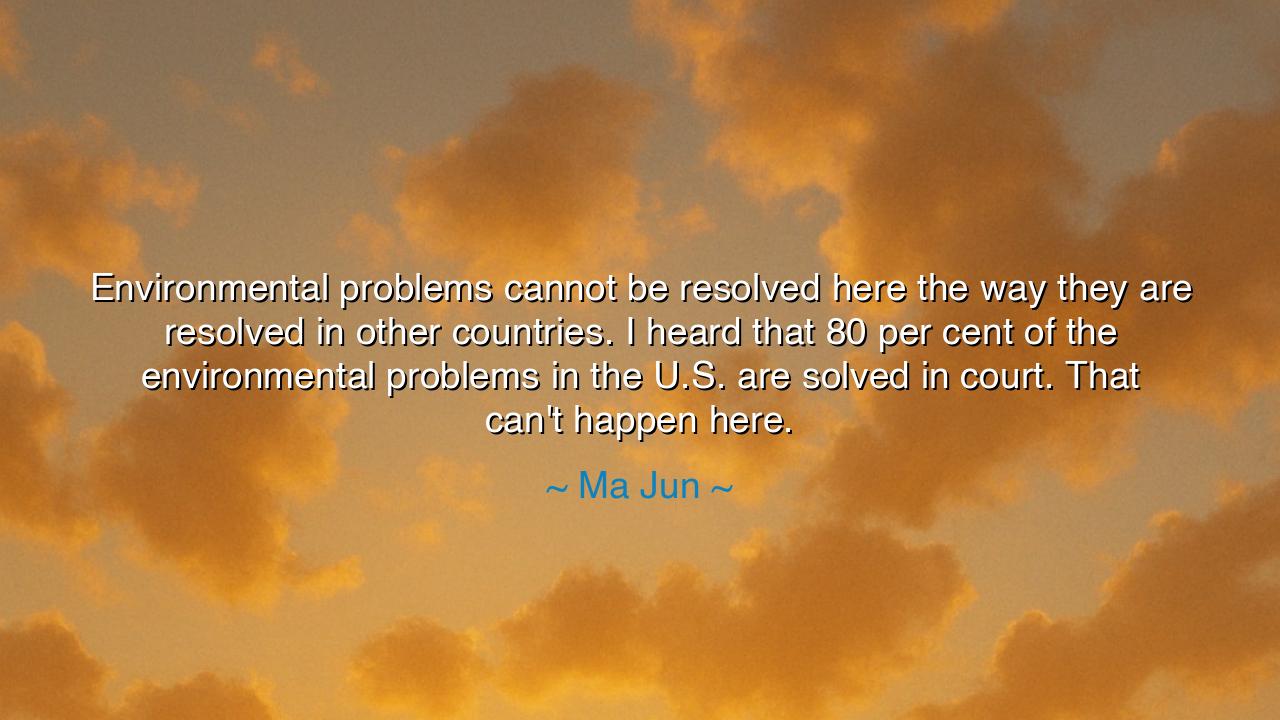
Environmental problems cannot be resolved here the way they are
Environmental problems cannot be resolved here the way they are resolved in other countries. I heard that 80 per cent of the environmental problems in the U.S. are solved in court. That can't happen here.






In a voice both cautious and profound, Ma Jun, one of China’s most influential environmentalists, once said: “Environmental problems cannot be resolved here the way they are resolved in other countries. I heard that 80 per cent of the environmental problems in the U.S. are solved in court. That can’t happen here.” These words are not merely a reflection of circumstance, but a revelation of struggle — the struggle between conscience and constraint, between the desire to heal the earth and the limitations imposed by systems of power. Within this quote lies both realism and quiet defiance — the recognition that the path to environmental justice must be shaped differently in every land.
Ma Jun, the founder of the Institute of Public and Environmental Affairs (IPE), spoke from experience forged in the fields of pollution, policy, and perseverance. He had seen rivers darkened by industry, skies turned to ash by unrestrained development, and communities silenced beneath the weight of bureaucracy. In the United States and other democracies, he observed, environmental accountability often takes form through the courts — where citizens and organizations can sue corporations or governments for environmental violations. But in China, where judicial independence and public litigation remain limited, this route is all but closed. Thus, his statement carries both sorrow and insight: if justice cannot be found in the courtroom, it must be pursued in new and creative ways.
Yet there is courage in his acknowledgment. To say “That can’t happen here” is not to surrender — it is to recognize the truth of the present so that one may find a better way forward. In the tradition of the ancients, Ma Jun stands as a realist-philosopher — one who knows that the greatest strength lies not in complaint, but in adaptation. Like the river he strives to protect, he bends around the obstacles of his time, seeking other channels through which change can flow. Where others rely on law, he relies on transparency — using data, research, and public information to awaken awareness and accountability.
His philosophy finds echoes in history. When the ancient Chinese scholar Qu Yuan was exiled for his honesty and forbidden to serve his country directly, he did not abandon his mission. Instead, he turned to poetry, encoding his love for his nation and his warnings of corruption into words that outlived his persecutors. Likewise, when Ma Jun found the courtroom closed to him, he turned to the power of knowledge. By creating China’s first public database of industrial pollution, he transformed invisibility into exposure — showing the people what had been hidden, and in doing so, giving them the tools to demand change.
In this, his work embodies a deeper truth: that justice takes many forms, and that the absence of one path must give birth to another. For those who cannot fight through law must fight through truth. The ancients would have called this the Way — the Tao — the principle of flowing where the river is open, rather than drowning against the dam. Ma Jun’s words, therefore, are not a lament, but a lesson in perseverance: that to change the world, one must understand both its walls and its openings.
And yet, his quote also reminds us of the moral burden carried by all societies. Where courts are silent, conscience must speak louder. Where laws falter, citizens must awaken. Environmental destruction is not merely a failure of regulation — it is a failure of empathy, of connection to the land that sustains us. The earth, though silent, records every injustice upon its soil and sky. To ignore its suffering is to erode the foundation of civilization itself.
The lesson, then, is one of creative courage. If justice cannot be found in one form, we must invent another. If power resists accountability, truth must rise in the hands of the people. Each generation faces its own barriers — legal, political, moral — but the duty remains the same: to protect life, to preserve balance, to serve both the earth and one another.
Thus, Ma Jun’s words stand as both lament and lamp — a lament for the limits of his time, and a lamp for those who will follow. “That can’t happen here,” he says, not as resignation, but as challenge. For though the court may be closed, the mind remains open. And through awareness, compassion, and persistence, the people will find their own way to justice — not by imitation, but by invention, guided by the eternal law of harmony between humanity and the earth.






AAdministratorAdministrator
Welcome, honored guests. Please leave a comment, we will respond soon